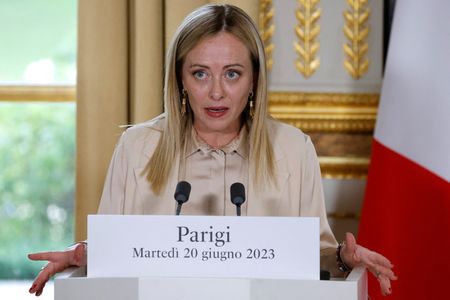By Angelo Amante and Gavin Jones
ROME (Reuters) -Italian Prime Minister Giorgia Meloni on Wednesday criticised the European Central Bank over repeated interest rate hikes, saying it was following a “simplistic” policy approach that could do more harm than good.
The ECB raised euro zone interest rates to their highest level in 22 years this month and said a ninth consecutive rate hike was all but guaranteed in July as it predicted inflation would stay above its 2% target through the end of 2025.
“It’s right to decisively fight inflation but to many people the simplistic recipe of rate hikes followed by the ECB doesn’t seem to be the right path,” Meloni told parliament.
Rising rates make it more costly for Italy to service the euro zone’s second largest debt pile, and Rome fears they will trigger another recession for what has been the bloc’s most chronically sluggish economy since the launch of the euro.
Meloni is the latest and most senior of a series of Italian government members who have taken aim at the ECB since it began its monetary tightening cycle.
Environment and Energy Minister Gilberto Pichetto Fratin said in an interview with La Stampa daily on Wednesday that “excessive” ECB rate hikes may prove to be a “boomerang.”
On Tuesday Foreign Minister Anonio Tajani said the ECB’s repeated hikes were “not in the interest of growth”.
Meloni, speaking to the Chamber of Deputies ahead of an EU summit in Brussels, said inflation was not being caused by an overheating European economy but by external factors such as the war in Ukraine which had fuelled rising energy costs.
“We must consider the risk that the constant increases in interest rates hurt our economies more than inflation, that the medicine ends up doing more harm than the illness,” she said.
ECB President Christine Lagarde said on Tuesday that euro zone inflation had entered a new phase that could linger for some time.
Conversations with seven rate-setters at the ECB’s annual forum in Portugal this week showed most expected it to increase borrowing costs again at both its July and September meetings despite signs the euro zone economy is flagging.
Italy’s ECB representatives – board member Fabio Panetta and Rome’s central bank chief Ignazio Visco – have been among the most dovish voices on the bank’s rate-setting governing council.
Visco steps down at the end of October, and the government on Tuesday proposed Panetta to replace him, leaving a vacant spot on the ECB’s six-person board.
As the bloc’s third largest economy Italy has always had a board seat. Even though this is not an automatic right, Tajani told reporters on Wednesday he was “optimistic” it would retain a representative when Panetta leaves.
(Editing by Crispian Balmer and John Stonestreet)












